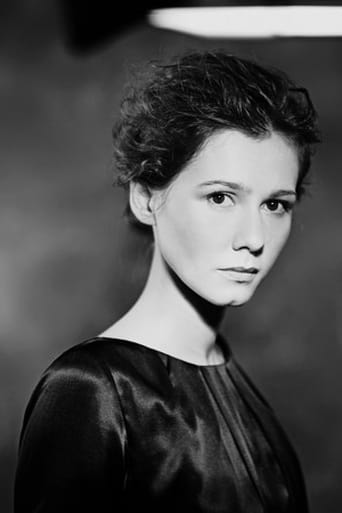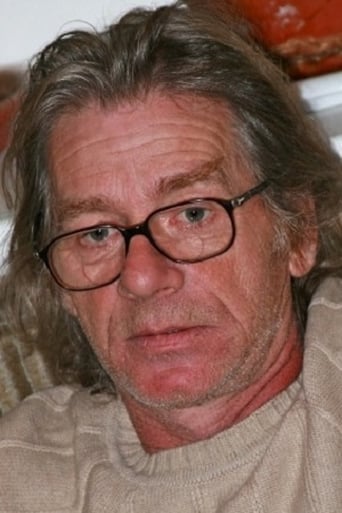SmugKitZine
Tied for the best movie I have ever seen
Thehibikiew
Not even bad in a good way
Majorthebys
Charming and brutal
Roy Hart
If you're interested in the topic at hand, you should just watch it and judge yourself because the reviews have gone very biased by people that didn't even watch it and just hate (or love) the creator. I liked it, it was well written, narrated, and directed and it was about a topic that interests me.
bosejiu
Maybe it is flawed at the core as someone mentioned - perhaps too erotic, too reckless when it comes to human relations (one would like to see a caring mother, a loyal husband etc.). But then there is the extensive imaginary of steppes, the ever-still nature indifferent to any human affairs. The force far greater than the convention. The long scenes are poetic, the music, the scarcity of dialogue - all together make an unforgettable experience. It's an astonishing spectacle of human passions.I see all the striving of the main characters as a way to break free from the slow death served by these idyllic landscapes. A way to show that human passions conquer everything: including nature, customs or any terrestrial rationality. Just like in the scene where Vera escapes her husband to the lover, escapes rooting away with the person she doesn't love to something uncertain, yet powerful enough to abandon what is certain. I think this film never really wanted to deal with morality and doesn't claim that infidelity is accepted, it rather shows two antagonistic powers: one of the stillness, and one of the passion. In the place where stillness reigns, passions burn one's soul, to burst when the time comes. For Vera and for Pavel the time has come. Once they break the flow of stillness, they are lost - lying on the grass completely aghast, muttering words that no longer have meanings, nor sound. Finally they are punished for breaking the flow, for their rebellion and courage. And that is what seems to beyond Vera's understanding, as if life didn't want to grant permission for that extraordinary happiness, as if it opposed their love. Or maybe it's not any metaphysical force but "merely" human passions - conflicting human passions in the flow of life that is beyond comprehension, just like a ride on a motorbike, arranged by someone else for you.
arsoys
The three things the creators of this horror wanted to do were: (1) Photograph lots of beautiful scenery, treating the big screen as a monstrous canvas for near-still photography merging into visual art;(2) Set it all to avant-garde classical music performed with electronic instruments;(3) Show the mindless brutality and degeneration that they believe to be the Russian psyche.(1) and (2) are self-evident at first glance. They're also quite secondary.And (3)? Well, how else to characterize a movie the plot of which is as follows: semi-degenerate-looking man goes crazy, then tries to seduce a cheaply country-erotic woman; fully degenerate husband of country-erotic woman cuts off finger of girl bitten by dog; neighbors take girl away; woman runs off with man, has wild sex in fresh air; husband burns empty house down to the ground, takes shotgun, shoots cow, shoots man and woman.Oh yes, and in between somewhere for no reason other than (3) otherwise apparent is a scene of a few degenerates partying away that ends with a woman stabbing someone in the chest with a fork.And let's not forget the degenerate-looking mental subnormal that drools as he rides his motorcycle, in scene after scene.Hell, perhaps there's more to the movie than (3).What it is, I don't know.But whatever it is, it is stinkily obscene.
vvol3
"Euphoria" is definitely a mix of two directing styles - theatrical and cinematographic. Or you might say two outlooks on life, two points of view on the world. And this mix is extremely rare and thus so extremely thoughtful and pleasant... Each sequence in the movie somehow reminds us of the theater stage - sometimes this stage is physically limited by some objects (posts, walls, buildings) or totally unlimited with endless plains and sky serving as the theater scenery. And sometimes what we see on the screen looks just like some photos or pictures, still art... But despite this movie's advantages from the professional point of view the best part of it is the emotional impact it's creating and definitely the ideas it's delivering. Actually, the whole movie's main idea is summarized by the director Vyripaev himself (who is in fact theater director, actor and playwright) in the first several minutes or even seconds of the film. I'm talking about the 'Disabled-guy- riding-a-bike' scene. It is some kind of the metaphor or allegory expressing director's look at the life itself. That intellectually challenged person is - who would you think? - the personification of any human in general. Just like him we don't have any idea who (or Who) put us on that bike (equal life) and what for. Just like him we can't figure out at first what we are doing in here and where are we heading to. We're confused but keep on moving because it's harder to get off that bike than staying on it. That's why we keep on looking ahead curious - what's going to happen. Later something terribly wonderful happens and we start loving that ride despite the fact that we've already turned away from the road. We start feeling filled with life - that's what is called Euphoria. We are still confused...but happy! Because we just don't care where is the right road and that we've already in the open steppe, plains. We keep on riding, "changing lanes", crossing somebody's lives flowing in the stream of the "mystic river" of the life, looking at the "vanilla sky" of this world...and having good time. This is Euphoria. Through this scene, and actually through the main plot, and through the side plots Vyripaev shows what such a fullness of life and love can lead to - death, happiness, sorrow, birth... Euphoria overall!
shusei
"Eyforiya" is a very expressive film from cinematographic point of view.With its simple story and strategic composition of image and sound it reminds me of Sokurov's debut feature film "Lonely man's voice(Odinokiy golos cheloveka)". As Sokurov's film, here we notice poetic composition based on associations and "ostranenie"(enstrangement)of ordinary life. Also one can say about symbolic use of Elements of Nature(Sun,Water,Clouds)which can be observed in such Russian art films as "The Mirror(Zerkalo)" and "Return(Vozvrashcheniye)"But here the total absence of religious motives and exposure of cultural and material poverty of Russian provincial village made it unique. We feel shocked by abrupt changes of different modes:from poetic one to ordinary,even banal one. Or the reverse movement. And this gap is even emphasized by music.I think, in this ironic play with two contrary different modes is the director's original contribution to Russian poetic school.






